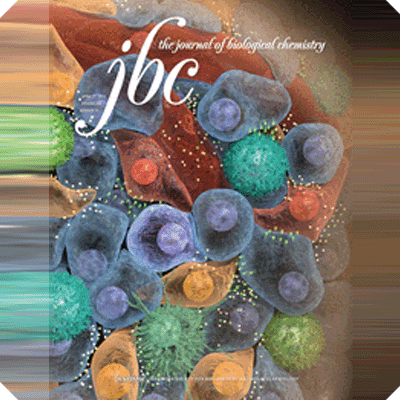Research Focus |
|
依赖中性鞘磷脂酶2的血管生成相关microRNA胞外转移来调控肿瘤细胞的转移 2013-08-09 14:21:17 浏览次数:13914 | |
| 依赖中性鞘磷脂酶2的血管生成相关microRNA胞外转移来调控肿瘤细胞的转移 来源:仪方生物 JBC 图片:肿瘤细胞(蓝色)向细胞外分泌小囊泡,这些外来体到达生物体的细胞微环境,如成纤维细胞(橙色)、免疫细胞(绿色)和内皮细胞(红色)。nSMase2可以激活外来体的miRNA分泌作用,在肿瘤微环境中通过诱导血管发生促进有效的肿瘤细胞转移起始。 介于肿瘤细胞和微环境细胞的体液因子的释放对于肿瘤细胞的转移至关重要,然而分泌的miRNAs在非细胞自主肿瘤抵抗微环境细胞中的作用仍未不清楚。研究者证明依赖中性鞘磷脂酶2的血管生成相关microRNA胞外转移促进血管生成以及调控肿瘤细胞的转移。在nSMase-2介导的血管生成的肿瘤细胞转移过程中需要胞外miRNAs作用。此外,转移的肿瘤细胞释放的miR-210显示转移到内皮细胞并且抑制特异靶基因(增强血管生成)的表达。这些发现提示来源肿瘤细胞的胞外miRNAs水平转移能够控制微环境缺口而利于肿瘤细胞的发展。 Neutral Sphingomyelinase 2 (nSMase2)-dependent Exosomal Transfer of Angiogenic MicroRNAs Regulate Cancer Cell Metastasis Nobuyoshi Kosaka, Haruhisa Iguchi, Keitaro Hagiwara, Yusuke Yoshioka, Fumitaka Takeshita and Takahiro Ochiya The release of humoral factors between cancer cells and the microenvironmental cells is critical for metastasis; however, the roles of secreted miRNAs in non-cell autonomous cancer progression against microenvironmental cells remain largely unknown. Here, we demonstrate that the neutral sphyngomyelinase 2 (nSMase2) regulates exosomal microRNA (miRNA) secretion and promotes angiogenesis within the tumor microenvironment as well as metastasis. We demonstrate a requirement for nSMase2-mediated cancer cell exosomal miRNAs in the regulation of metastasis through the induction of angiogenesis in inoculated tumors. In addition, miR-210, released by metastatic cancer cells, was shown to transport to endothelial cells and suppress the expression of specific target genes, which resulted in enhanced angiogenesis. These findings suggest that the horizontal transfer of exosomal miRNAs from cancer cells can dictate the microenviromental niche for the benefit of the cancer cell, like “on demand system” for cancer cells. |
